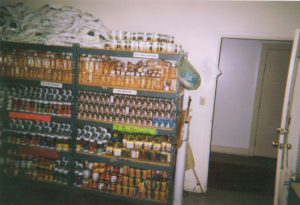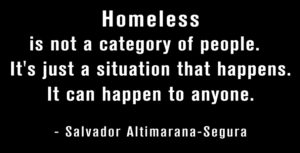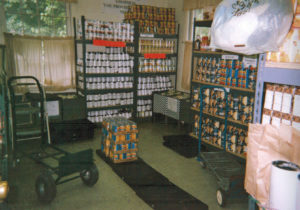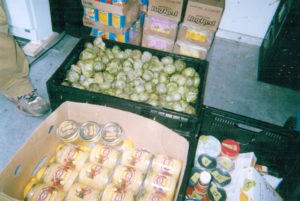Are You Working On or Off?

A fairly common question I heard in the pantry line: “Are you working on or off?”
The first time I heard this question, I was confused. What did it mean? Actually, it referred to whether or not the person was paid in cash under the table or was paid money with withholding taken out.
Often the answer was something like: “I’ve got two days over at the food store and three days at Mrs. O……’s where I help her with her house and her office. I’m looking for a few more hours but it’s not happening.”
What this question asked was how many hours a person worked on the books and how many hours off the books. Not only was this practice illegal but it robbed workers of any benefit accrual and the opportunity to pay taxes.
Minimum wage paychecks simply don’t last a week. Individuals, families, entire households even can be employed and still live in poverty. My experience in the pantry was that more people in the pantry shopping line are employed than not.
I used to think of people as being employed or unemployed.
As I gained experience with the situation, I added another label: underemployed. So, rather than thinking in terms of employed or unemployed, I thought of hungry people in the line as being employed or underemployed.
I still see unemployed people but I realized many people aren’t paid a living wage.
I see shoppers where each person in the household works more than one job. The hope, dream, goal for many is simply to work enough hours and make enough money that a person can take a day off occasionally and have enough money to eat the following day.
People holding down more than one job often had trouble finding time to get to the Department of Social Services office to apply for SNAP (food stamps), although they might have qualified for the benefits.
Without a secure community safety net for the poor and destitute in our country, pantry volunteers needed to feed groceries weekly to families and households without money after they paid for rent and transportation to get to work.
Since the ’90s, many states have been “hell bent to Harry” to get people to work…no matter what. Welfare is no longer on the table.
A tip: Some people don’t realize our nation hasn’t offered much in the way of welfare in a long, long time. In polite conversation, I heard a statement: “That person shouldn’t be in your line. Her son has a job and she has a car.” I find it amazing that people in this country have been and continue to be comfortable denying assistance to the needy and destitute families while offering tax breaks to the wealthy.
My question was this: “How do people cope?”
Work first is not always a good option. I regularly saw pantry shoppers with family members who would be institutionalized if they weren’t being cared for by family. The institution is always the more expensive option.
The problem was that the family had nothing. So, while Helen or Sue or Fred was caring for the ill/disabled person, s/he wasn’t able to work.
Employment opportunities are a large part of the problem. People find themselves down and out in places with few job opportunities. Young people graduated from high school or college and can’t find a job anywhere.
Every economic downturn erases job opportunities. When the economy finally recovers, many jobs don’t return. Each recovery creates a class of citizens permanently living in the poverty of unemployment, underemployment, temporary employment, and day labor. Part time employment and being “on call” is a way of life.
The new group created after the downturn of 2008 had its own label: The Struggling Class.
Education costs are a factor. Fewer and fewer people can afford college or trade school. Some are afraid of the college loans they might not be able to pay off. One young woman in our food pantry line worked sixty hours weekly in low wage jobs to repay her college loan.
A fundamental attitude adjustment helped us realize food stamps, food pantries, soup kitchens, and shelters are no longer emergency concepts. They are the new way of life in the 21st century.
BEN
“I’m finished!” he blurted out. ” They fired me today!” I’ll never be able to get another job again. I’m too old!” Frightened reality covered his face when he entered the pantry for the first time. I didn’t say a word. I let him shout. He didn’t look or act as if he was going to hurt anyone and I felt he needed to release his anger.
I wanted his life to be easier than it was but what I wanted for him or any other shopper was nothing more than wishful thinking. There was little to nothing I could do. And, truthfully, I was helpless to do anything for him beyond offering a three-day-supply of food.
Every week after the first visit, he entered the pantry, shopped, and never made a sound. The mask of his face never changed.
Once the hair goes grey, it’s hard to compete in the market place. In a down economy, employers hire the younger applicants believing they’ll work harder for less money.
I hoped his unemployment would hold out until he could figure out how to get something more.
We all just left him alone. The pantry space was so small. It took him a year to calm down.
All we had was delicious, nutritious, food with a heavy emphasis on fresh vegetables and fruits. I relied on the food to make up for what we didn’t have.
I saw him recently – calm, maybe at peace with his situation. He lives in his truck, semi-homeless I suppose. He has places to bathe and sleep when he’s in Woodstock.
Woodstock attracts musicians. He’s one of those considered talented, this man. He’s found places to play around the area and he’s looking okay. What more can we all ask for anyway?
Thurman Greco
Thank you for reading this blog post. Please refer it to your favorite social media network.
Thurman
A new book is coming soon! Please be on the lookout for Miracles!
Thanks again!












